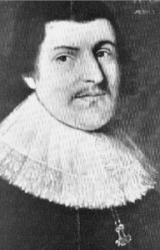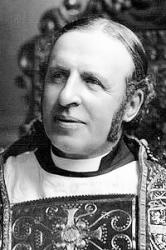Planning worship?
Check out our sister site, ZeteoSearch.org,
for 20+ additional resources related to your search.
- |
User Links
Person Results
Henry Thomas Smart

1813 - 1879 Person Name: H. Smart Composer of "GENOA" in Common Praise Henry Smart (b. Marylebone, London, England, 1813; d. Hampstead, London, 1879), a capable composer of church music who wrote some very fine hymn tunes (REGENT SQUARE, 354, is the best-known).
Smart gave up a career in the legal profession for one in music. Although largely self taught, he became proficient in organ playing and composition, and he was a music teacher and critic. Organist in a number of London churches, including St. Luke's, Old Street (1844-1864), and St. Pancras (1864-1869), Smart was famous for his extemporizations and for his accompaniment of congregational singing. He became completely blind at the age of fifty-two, but his remarkable memory enabled him to continue playing the organ. Fascinated by organs as a youth, Smart designed organs for important places such as St. Andrew Hall in Glasgow and the Town Hall in Leeds. He composed an opera, oratorios, part-songs, some instrumental music, and many hymn tunes, as well as a large number of works for organ and choir. He edited the Choralebook (1858), the English Presbyterian Psalms and Hymns for Divine Worship (1867), and the Scottish Presbyterian Hymnal (1875). Some of his hymn tunes were first published in Hymns Ancient and Modern (1861).
Bert Polman
Henry Thomas Smart
Frederick C. Atkinson
1841 - 1896 Composer of "MORECAMBE" in The Church Hymnal Born: August 21, 1841, Norwich, Norfolk, England. Died: November 30, 1896, East Dereham, Norfolk, England. As a boy Atkinson was a chorister and assistant organist at Norwich Cathedral. In 1867 he graduated with a Bachelor of Music degree from Cambridge and then served as organist and choirmaster in St. Luke's Church, Manningham, Bradford. He also held that position at Norwich Cathedral and at St. Mary's Parish Church in Lewisham. Atkinson wrote hymn tunes, anthems, and complete Anglican services, as well as songs and piano pieces.
Psalter Hymnal Handbook, 1988
Frederick C. Atkinson
Henry Lawes

1596 - 1662 Person Name: H. Lawes, 1596-1662 Composer of "BATTLE" in The Methodist Hymn-Book with Tunes Born: January 5, 1596, Dinton, Wiltshire, England.
Died: October 21, 1662, London, England.
Buried: In the cloisters of Westminster Abbey, London, England.
Lawes, tutor to the daughters of the Earl of Bridgewater, is best known as a composer. He became a Gentleman of the Chapel Royal in 1626, and a member of the "King’s Musick" in 1631. He wrote over 400 vocal pieces, as well as anthems and instrumental compositions. His works include:
Choice Psalmes Put into Musick for Three Voices, 1648
Ayres and Dialogues (London: 1653)
Sources:
Frost, p. 680
Hughes, pp. 467-68
Nutter, p. 460
Stulken, p. 292
--www.hymntime.com/tch
Henry Lawes
H. C. G. Moule

1841 - 1920 Author of "Come In, O Come!" in The Church Hymnal Moule, Handley Carr Glyn, M.A., son of the Rev. H. Moule, was born at Fordington, Dec. 23, 1841, and educated at home and at Trinity College, Cambridge, B.A. in first class Classical and Theological honours, 1864-65. He was Carus Prizeman, 1862; Browne's Medallist, 1863; and gained the Seatonian Prize, 1869-73 and 1876. Taking Holy Orders in 1867, he was curate of Fordington, Dorset, 1867-73, and 1877-80; Dean, Trinity College, Cambridge, 1874-77; and Principal of Ridley Hall, Cambridge, 1880. He was Fellow of his College, 1865; Select Preacher at Cambridge, 1880-81, 87; and Chaplain to the Bishop of Liverpool, 1880. His works include:—
(1) The Seatonian Prize Poems as above; (2) Poems on the Acts of the Apostles, 1869; (3) Sermons on the Litany, 1870; Dorchester Poems, 1878; (4) Commentaries on the Epistles to the Romans, Ephesians, and Philippians, in the Cambridge Bible for Schools, 1880-89; (5) Christianus and Other Poems 1883; (6) Thoughts on Christian Sanctity, 1885 (with hymns appended); (7) On Union with Christ, 1885 (with hymns appended); On Spiritual Life, 1887 (with hymns appended) ; and others. Mr. Moule was also a contributor to Smith's Dictionary of Christian Biography.
Of Mr. Moule's hymns the following appeared in the Appendix to the Fordington Hymn Book, 1878:—
1. Chief Shepherd of Thy people. Missions.
2. Jesus, such His love and power. A present Saviour.
3. Lift heart and voice above. Christmas.
In the same Appendix there is a paraphrase of the Benedicite in metre, "Bless the Lord of glory," by H. M. Moule, M.A., of Queen's College, Cambridge, his brother.
--John Julian, Dictionary of Hymnology (1907)
================
Moule, Handley C. G., p. 771, ii. In 1899 Dr. Moule resigned his post at Ridley Hall, and became.Norrisian Professor of Divinity at Cambridge. In 1901 he was consecrated as Bishop of Durham. The following additional hymns by Bp. Moule have come into common use:—
1. Come in, O come! the door stands open now. [Seeking after Holiness.] Appeared in the 2nd ed. of Hymns of Consecration and Faith, 1890; and in the author's Songs in the House of the Pilgrimage, 1896.
2. Dear is Thy Presence with Thy friends. [Communion of Saints.] Included in Hymns of Consecration and Faith, 1890.
3. Lord and Saviour, true and kind. [Jesus the Guide of Youth.] Appeared in The Council School Hymn Book, Novello, 1905.
4. Lord, is it I that enter here. [Victory over sin.] First published in the author's Christian's Victory over Sin, 1888.
5. My glorious Victor, Prince Divine. [Consecration of Self to God.] Appeared in the 2nd edition of Hymns of Consecration and Faith, 1890; and again in the author's Songs in the House of the Pilgrimage, 1896.
6. Raise the song, ye loyal voices. [King's Coronation.] Written for Novello's Ten National Hymns and Tunes for children's use on the occasion of the Coronation of King Edward VII., 1902.
7. They watched Him up the silent skies. [Ascension.] Written for Dodderidge's Hymns for Church & Home, 1904.
Additional publications by Bp. Moule which include hymns are Songs in the House of the Pilgrimage, 1896; The Christian's Victory over Sin, 1888. Poems on the Acts of the Apostles, &c, 1869; Christianus and other Poems, 1883; At the Holy Communion, 1892; Thoughts on Union with Christ, 1886.
--John Julian, Dictionary of Hymnology, New Supplement (1907)
H. C. G. Moule
Cuthbert Howard
1856 - 1927 Composer of "[Come in, O come! the door stands open now]" in Williston Hymns Cuthbert Howard was for many years Organist of The Wesleyan Chapel, Collyhurst, Manchester, U.K. He also composed RAKESTRAW sometime before 1913, which appeared in the "Methodist Sunday School Hymn Book."
Gary Hulme
Cuthbert Howard
Edward M. Fuller
Composer of "[Come in, O come, the door stands open now]" in One Hundred Gospel Hymns Early 20th Century
Edward M. Fuller


 My Starred Hymns
My Starred Hymns


